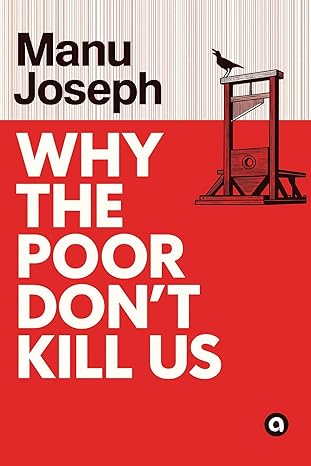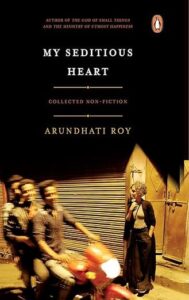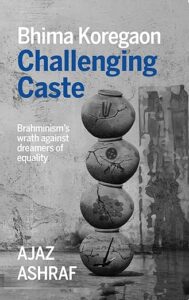Why I Picked This Book
The title of the book, “Why The Poor Don’t Kill Us”, caught my attention. In a country of extreme inequality, where the majority lacks basic necessities like education, healthcare, clean and safe drinking water, and a decent place to live, this is a logical question. Moreover, I appreciate Manu Joseph’s writing, which is always sharp, witty, laced with sarcasm, and filled with dark humor. The combination of title and author made me pick up this book as my next read.
The Book
Why The Poor Don’t Kill Us is the first non-fiction book by Manu Joseph, where the author dissects poverty and the psychology of the poor, as well as the rest of us. By asking this, he raises an important question: why do the daily miseries of the poor not make them protest against the rich and the system that is rigged against them? Why are they content or okay with the daily hardships they face during their lifetime, and even in death?
There is a photograph of a man carrying what at first glance appears to be a heavy artefact. He was seen in August 2016. His name is Dana Manjhi, and what he was carrying was his dead wife. At the time when the photograph was taken by curious passers-by, he had walked over 10 kilometers carrying her corpse. The hospital asked Dana to take her away, but he did not have the money to hire a vehicle to transfer her body to their village on top of the hill, about 60 kilometers away.
Joseph argues that it is the poor of the country who subsidize the middle and upper middle class of the society. Although the most common argument of middle-class people (in reality, the upper middle-class and above) is that their income tax money subsidizes the poor. It is because of the poor that the government is forced to keep the price of essential commodities low, which the middle-class and above consume more than the poor.
The author makes a striking observation: the poor don’t envy the rich; they envy other poor. He argues that envy does not arise towards a distant rich but towards one’s neighbour, relatives, or anyone who is doing better than oneself. I think the same can be said about the rich as well, though perhaps it is implied when he said, “Envy is a thing between equals”.
In the heart of all the good that India tries to do – not only through policy but also through pious activism – there is this unspoken sense that low standard ‘will do’ for the poor. India’s very definition of comfort is a state that is inaccessible to the poor.
This, I believe, is precisely the reason we have our education, healthcare, public transport, and public spaces in such poor condition. The rich have a parallel system for them insulated from what the majority of India experiences. Yet, their privilege isn’t absolute; when on roads or passing through places they would normally avoid, they too momentarily experience the realities as everyone else.
The book comes as a rude shock and realization with many counter-intuitive arguments, be it about using higher education to come out of poverty, the role of NGO’s and humanitarian organizations in helping the poor and alleviating poverty. His views would make you pause and think. We all know the kind of jobs that the poor do in India, and when you are Dalit or from a lower caste, the situation is more humiliating. Is it because we are a billion and a half (so labour is cheap), or because we are really a poor nation (though we feel proud to be the 5th largest economy), or because we don’t value human capital? It is a point to ponder.
There are some arguments where I don’t agree with him, like his justification of AADHAR, his loathing of left-wing activism, his views on people studying humanities, and the discipline itself. His views on Humanitarianism may be true for ‘organised humanitarianism’, but I disagree with his sweeping generalization:
Humanitarianism has become a magnet for the mentally unstable who are compelled or wish to see unhappiness in everything. It is not a place where the happy can thrive. As there is a perpetual over-articulation of all that is bad in the world, it is a dangerous place to be in for suicidal or merely the gloomy, like young people often are.
To say humanitarians ‘wish to see unhappiness in everything‘ is an oversimplification that undermines their hard work, empathy, and genuine desire to help people. He further asks a question, “What is the relevance of ‘good guys’ who always lose? This is a genuine question, and I also grapple with it. But I realise we need such people because they speak about equality, harmony, and freedom, and without them, these important values might be forgotten.
Who Should Read This Book
Anyone curious about India’s social and economic realities, eager to question the common assumptions about the poor in India, and who enjoys sharp, thought-provoking, and witty writing with some dark humor. A perfect read for someone who likes to be intellectually challenged.
About The Author
Manu Joseph is the author of the novels Serious Men, The Illicit Happiness of Other People, and Miss Laila, Armed and Dangerous. He is the winner of the Hindu Literary Prize and the PEN Open Book Award, whose jury described him as ‘…that rare bird who can wildly entertain the reader as forcefully as he moves them’. He has been nominated for several other prizes. He is also the creator of the Netflix series, Decoupled


